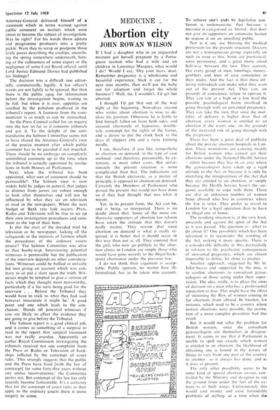THE LAW
Comment and contempt
R. A. CLINE
Lord Justice Salmon's Home Office Com- mittee has just performed a skilful minor operation on the law of contempt. The eminently readable report contains some recommendations for clarifying the present law which are bound to bring a little light relief to the Terrible Three (who are acco- laded throughout the report by being granted the Victorian privilege of capital letters) Press, Television and Radio.
The genesis of the report occurred just after the Aberfan disaster when Lord Robens and others were interviewed on tele- vision and gave their views about the causes of the trouble, who was to blame and like matters. At the time of these interviews the Prime Minister had announced that there would be an inquiry at the highest level so that it was clear to everyone that an investi- gation was on the cards. On the other hand Parliament had not then carried out the formalities which were required to establish a tribunal of inquiry. Resolutions had yet to be passed in both Houses.
It was during this gestatory period before the actual birth of the tribunal that the
Attorney-General delivered himself of a statement which in terms warned against
public comment on matters which were
about to become the subject of investigation. Was he right? For his words threw editors and programme producers into a pretty pickle. Were they to scrap or postpone those lively pieces describing the coaltips, unearth- ing the spring somewhere underneath, hint- ing at the callousness of some expert or the negligence of some Coal Board official, until Lord Justice Edmund Davies had published his findings? The decision was a difficult one editor- ially, commercially, legally. A law officer's words are not lightly to be ignored. But then there is the public agog for information before the investigation begins, waiting to
be fed; but when it is over, appetites are satisfied by the pabulum proffered in the tribunal's report. A footnote from the com- mentator is as much as can be stomached.
So the Press Council called for an inquiry into the law so far as it concerns tribunals
and got it. To the delight of the anti-
mandarins the Salmon Committee seems not to have shared the Attorney-General's view of the precise moment after which public
comment has to be guarded if not muzzled. There should be no embargo on completely
uninhibited comment up to the time when the tribunal is actually appointed by resolu- tions in both Houses of Parliament.
Next, when the tribunal has been appointed, what sort of comment should be permissible? The Salmon view is now
widely held by judges in general, that judges as distinct from jurors are robust enough
to look after themselves and will not be influenced by what they see on television or read in the newspapers. When the next
budget or Bank rate leak occurs. Press, Radio and Television will be free to set up their own investigation procedures and com- ment to the top of their bent. Is this the start of the dreaded trial by television or by newspaper, lacking all the safeguards in the interests of fairness which
the procedures of the ordinary courts ensure? The Salmon Committee was alive
to that booby-trap. Interviewing potential
witnesses is permissible but the publication of the interview depends on other considera-
tions. 'Witnesses could be bullied or unfairly led into giving an account which was con- trary to or put a slant upon the truth. Wit- nesses might be tempted to give a version of facts which they thought most newsworthy, particularly if a fee were being paid for the interview . . . Before the Tribunal they would have to stick to what they had said however inaccurate it might be.' A good point and one which leads to the con- clusion: Hands oft potential witnesses if you are likely to affect the evidence they are going to give before the Tribunal. The Salmon report is a good clinical job, and it comes as something of a surprise to read in the report that surgical treatment was not really overdue. Apparently an earlier Royal Commission investigating the tribunals received not one complaint from the Press or Radio or Television of hard- ships inflicted by the contempt of court rules. 'This strongly suggests that the public and the Press have lived [with the law of contempt] for some forty-five years without any undue inconvenience,' the Committee points out. But contempt of the law has only recently become fashionable. It's a certainty that for the contempt of court rules as they apply to the ordinary courts there is more surgery to come.



































 Previous page
Previous page